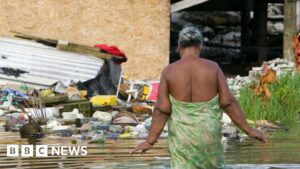
WASHINGTON — Eight men, previously deported from the United States and held at an American military base in Djibouti, have finally been relocated to South Sudan. This move concludes weeks of legal challenges that reached the U.S. Supreme Court. The deportation has drawn significant attention due to South Sudan’s current state of instability, with the U.S. State Department advising against travel to the region due to “crime, kidnapping, and armed conflict.”
The individuals, originating from Cuba, Laos, Mexico, Myanmar, Vietnam, and South Sudan, arrived in South Sudan on Friday. Their transfer was facilitated after a federal judge cleared the way, following a Supreme Court decision that allowed their removal from the U.S. Homeland Security spokeswoman Tricia McLaughlin stated, “This was a win for the rule of law, safety, and security of the American people,” as she announced the men’s arrival in the war-torn nation.
Legal Challenges and Supreme Court Ruling
The Supreme Court’s decision on Thursday was pivotal in allowing the deportation to proceed. Initially, the men were put on a flight in May, destined for South Sudan. However, the flight was rerouted to Djibouti after a federal judge found that the administration had violated an order by not allowing the men an opportunity to challenge their removal.
The court’s conservative majority ruled in June that immigration officials could expedite deportations to third countries. This decision overturned a previous order that permitted immigrants to contest deportations to countries where they might face danger. The legal tug-of-war included a series of court hearings, even on Independence Day, which temporarily halted the deportations.
“The Supreme Court’s ruling effectively tied the hands of lower courts, leaving little room for further legal intervention,” said a legal expert familiar with the case.
Background and Implications
The deported men had been convicted of violent crimes in the U.S., according to administration officials. Their case highlights the complexities of immigration law, especially concerning deportations to countries with unstable political climates. South Sudan, a nation grappling with the threat of civil war, presents significant risks for deportees.
Historically, the U.S. has faced challenges in deporting individuals to countries with which it has limited diplomatic relations or where safety cannot be guaranteed. This case underscores the ongoing tension between enforcing immigration laws and adhering to international human rights standards.
Expert Opinions and International Reactions
Immigration experts have expressed concerns about the potential human rights implications of deporting individuals to conflict zones. “While the legal process may have been followed, the ethical considerations are far more complex,” noted an immigration policy analyst.
International human rights organizations have criticized the deportation, arguing that it puts the individuals at risk and violates international conventions on the treatment of refugees and asylum seekers.
Future Considerations and Policy Implications
The deportation of these men to South Sudan could set a precedent for future cases involving deportations to third countries. The U.S. administration’s stance on immigration enforcement remains a contentious issue, with debates likely to continue over the balance between national security and humanitarian obligations.
As the situation in South Sudan remains precarious, the international community will be watching closely to see how these deportations impact the individuals involved and the broader geopolitical landscape.
“This case serves as a reminder of the complexities and moral dilemmas inherent in immigration policy,” said a former U.S. diplomat.
Moving forward, it will be crucial for policymakers to consider both the legal and ethical dimensions of deportation cases, especially those involving countries in conflict.






